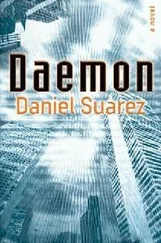Grady turned forward again. “What does any of this have to do with me? Why am I here?”
“Manipulation of gravity. Hard to imagine you did it—and with so few resources. But have you really not considered the implications of your discovery?”
Grady just stared at him.
“Come walk with me.” He motioned for Grady to follow him as double doors to their left silently opened, revealing a carpeted corridor extending beyond.
“Where are we going?”
Hedrick smiled genially. “Everything is fine, Jon. More than fine. Everyone here is talking about you. We’re all excited. I’d like to show you something.”
“What?”
“The true course of history. I want to show you what human ingenuity has actually achieved.”
With one last glance back at the obsequious robot still nodding at him, Grady got to his feet and followed as Hedrick placed a comforting hand on his shoulder.
“You should know that I’ve been in your position. Twenty-eight years ago. I know it’s not easy, but you’re a scientist, Jon. If it’s truth you’re after, there are wonders ahead…”
He ushered Grady into a long gallery lined with pedestals holding a series of displays—a museum by the looks of it. The closest pedestal held a sturdy-looking ceramic-and-glass construct from which a blinding white light shone. The device was the size of a washing machine. Holographic letters beneath it proclaimed:
First self-sustaining fusion reactor—May 6, 1985: Hedrick, Graham E.
Grady held his hands up to block the blinding light. “You can’t be serious…”
“I’m always serious.”
“Fusion . You perfected fusion .”
Hedrick nodded.
“Fusion energy?”
“I told you I’ve been where you are now.”
Grady looked back and forth between the reactor and its creator. Dumbfounded.
“I’m a plasma physicist by training. Toroidal magnetic confinement fusion devices were my specialty.”
“I…” Grady searched for words.
Hedrick nodded toward the reactor. “This is a later model. The first prototype was huge and output only a hundred megawatts. Even this one’s crude compared to what we have now.”
“But… 1985?”
“Certain innovations serve as catalysts for each other—creating a positive feedback cycle. Eventually a technology becomes inevitable. It’s managing the transition that’s critical. Fusion and quantum computing are good examples. Improved reactor designs were made possible by computer simulations of nonlinearly coupled phenomena in the core plasma, edge plasma, and wall regions of reactor prototypes. The vast energy from fusion made more powerful computers possible. And more powerful computers, better fusion reactor designs. They are symbiotic. Gravity modification will be another key symbiotic technology.”
Hedrick nudged Grady along to the next exhibit. “I wanted to show you this gallery because these are the advances that will one day transform human civilization.”
“And you’re keeping them secret? Even your own fusion work?”
“We prefer to think of it as safeguarding them. Preparing the world for the massive changes these innovations will bring about. A sudden influx of innovation could disrupt social order, and disruption of social order is not to be taken lightly, Jon.” Hedrick brought them to the next display. It was a holographic animation hovering in midair. It depicted living cells replicating in a petri dish. The plaque read:
Cure for Malignant Neoplasm—November 1998: Rowe, Rochelle, MD, et al
“ Cancer? You cured cancer?”
“Doctor Rowe did, yes—or at least most forms of it. An elusive pocket on the surface of protein 53.” Hedrick nodded and ushered Grady onward.
“How the hell can you ethically conceal a cure for cancer? Do you realize how many millions of lives would be saved? How many tens of millions of lives?”
“The human population is still growing rapidly. Even with cancer.”
“What gives you the right to withhold this from people?”
Hedrick looked on patiently. “Jon, the BTC predates me. It was founded in the years before the moon landings—as the pace of technological change threatened to overwhelm our social and political institutions. The BTC grew out of a section of the Directorate of Science and Technology. It was formed to monitor research worldwide for disruptive technologies, to classify them, and to regulate their future release to the general public. We don’t have a perfect record—Steve Jobs was a tricky one—but we’ve managed to catch most of the big disruptors before they brought about uncontrolled change.” He gestured to the line of exhibits stretching before them. “As you can see.”
Grady let a disgusted laugh escape. “Who says technology was threatening to overwhelm our social and political institutions? The space program inspired kids to go into science.”
Hedrick nodded. “Yes, but how would humanity have coped with cures for most diseases? With limitless clean energy? With greater-than-human artificial intelligence? These would result in irreversible changes to society. Changes that we’re seeing even now, despite our best efforts at management.”
“I can’t believe you think this is ethical.”
“Relinquishing my own achievements with fusion was one of the hardest things I have ever done. But I made that sacrifice for the common good.”
Grady clenched his hands. “You have no right to decide the pace of technological change.”
“Now you sound like someone we both know.”
Grady recalled the face of the madman whose followers had so recently strapped him to a bomb.
Hedrick saw the realization in Grady’s eyes. “Yes, Richard Louis Cotton—the public face of the antitechnology movement. Every once in a while his Winnowers strike at some scientist or lab. It’s just a means of control, Jon. Cotton’s movement is an illusion. A method of misdirection. You are all quite alive, after all.”
Grady moved away from Hedrick warily. “Cotton works for you?”
Hedrick sighed. “Not for me—the BTC. I know it’s upsetting, but everyone is fine.”
“We’re not fine. Where’s Doctor Alcot? Where are Raj and Mike? I want to see them. Right now.”
“That’s not possible, Jon. They’ve already come to terms with the BTC. Until you join us, you can’t join them.”
“Join you? Why on earth would I join you? You’re abducting researchers and scientists. Concealing life-changing scientific breakthroughs. I’m not joining you.”
“We do what must be done. And even then only when truly disruptive innovation occurs and containment risks are high.”
“What ‘containment risks’?”
“Some technologies are too dangerous to be allowed to spread on their own. Left to chance, technologies like fusion and antigravity would sweep away existing social systems. They would change every society they touched.” Hedrick gestured to several more exhibits lining the corridor. “Shall we continue?”
“You’re going to add gravity modification to this museum of yours, aren’t you?”
“You should feel honored. I know I do. Very few innovations require complete isolation. Yours is one of them. Our models suggest that mastery of gravitation is what’s known as a keystone. When combined with other advances—like fusion—gravity manipulation will catapult humanity to a much higher technological level. In this case, moving us for the first time into a Type One civilization—a society capable of moving entire planets. Of building warp drives. Capturing the entire energy output from our star.”
“That’s a bit much, don’t you think?”
“Your modesty is admirable, but your contribution stands alongside those of the greatest minds in history. Think of this: the notion of a ‘fictitious force’—Newton’s second law. In a closed box, an observer would not be able to distinguish between acceleration and the force of gravity. Einstein himself attributed the apparent acceleration of gravity to the curvature of space-time. Inertial mass and gravitational mass were not just equal—they were the same force. Yet, combined with our knowledge of extra dimensions, we might be able to use your work to disprove the equivalence principle at a high level of precision—and that’s just one of many possibilities. You’ve made an unprecedented breakthrough.”
Читать дальше












